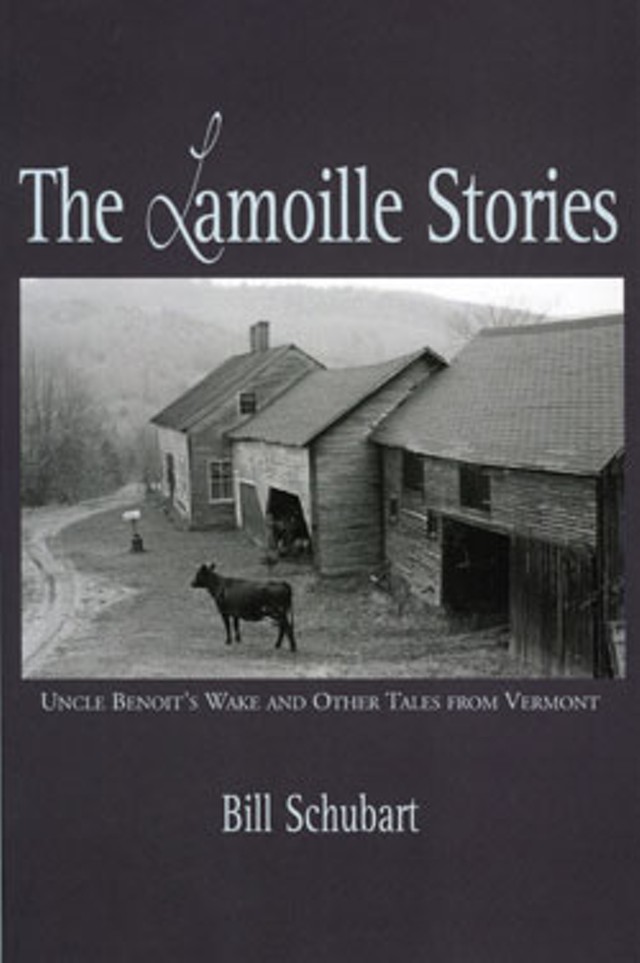Published November 25, 2008 at 9:31 p.m.
People often joke that the nice thing about Burlington is it’s so close to Vermont. But they’re talking about a particular version of Vermont: the mountains with hiking access, the picturesque restored dairy barns, the white-steepled meeting houses. Not the decrepit trailer homes dotting the hollows on Class III roads, their front yards decorated with rusting cars. Not the homeowner who has left his Civil War-era house to rot and erected a “new” one steps away out of tattered tarps and discarded two-by-fours. Not the flask-tipping fisherman who casually resorts to dynamite when the perch aren’t biting.
This is the Vermont Hinesburg writer Bill Schubart depicts — humorously, empathetically and with a fair amount of nostalgia — in The Lamoille Stories: Uncle Benoit’s Wake and Other Tales from Vermont. Though born in New York City, Schubart, now 63, grew up in the village of Morrisville in Lamoille County. His 22 stories take place between the late 1950s and about 1970, a period when the county’s natives, clinging to spare livelihoods in farming and logging, began confronting in earnest the colonization of their territory by well-heeled but clueless outsiders. (Lamoille County, after all, includes that mecca of flatlander foolishness, Stowe.)
Schubart’s hill-town characters find the newcomers’ dreams of country living a source of amusement and disdain, given how little resemblance they bear to the reality of life in Wolcott or Waterbury. But those dreams are also a prime opportunity for pranksterism and profiteering. The Lamoille Stories is rife with tales of locals’ shenanigans at outsiders’ expense. A New Jerseyite’s new Christmas tree farm dies en masse in a single night, to his puzzlement; another Garden Stater’s Craftsbury pond lodge is hauled through the woods to a more distant site by a miffed neighbor.
There’s Duke, who laconically advises his newcomer neighbor Jack not to erect such a large, shiny mailbox. Not knowing what a tempting trophy this will be for Duke’s mailbox-bashing buddies, Jack says he doesn’t understand. “Ya will,” Duke replies.
“The Ferlands’ Pet Pigs” sympathetically tells of a French-Canadian farm family’s attempt to cash in on the new craze for piglets as household pets. A small, black pot-bellied breed is selling for more per pig than Cécile’s father Laurent gets for a litter of 10 pork pigs plus the sow. The Ferlands figure their pink piglets merely require a dip in a vat of black dye to render them saleable. The ruse works for a while — until the Baroness von Trapp calls to say that “her little Fritz seemed to be a bit larger than her friend Hilda’s pig . . . Fritz was nearing 140 pounds and his little hooves were beginning to make deep marks in the soft pine floor in the lobby.”
Schubart’s Vermont characters don’t have much use for laws, viewing them as only more evidence of outsiders’ folly. In “Wyvis’ Fence,” the title character, a self-taught car mechanic, is required by a new law to hide his vast collection of parts cars from sight with a 6-foot opaque fence. “To many Vermonters, a yard full of ‘parts cars’ was an indicator of good automotive management, not an eyesore,” the narrator reports. But metal-hulk-strewn yards were “inconsistent with the pastoral photographs in Vermont Life, which might show one or two tractors working in a field, a well-kept pickup in a yard, or traditional horse-drawn implements that looked suspiciously as if they had been borrowed from the Shelburne Museum.” Wyvis manages to ignore the law until the state steps in and erects the fence for him.
Like “Bert and I” — the comedy duo who popularized a laconic strain of Maine humor poking fun at native insularity — Schubart often turns a mocking eye on his uneducated Vermont characters, too. In “Jeeter Goes to New York,” Jeeter tries ice fishing in a cardboard shanty sealed with duct tape. The winter gale seizes the homemade rig as if it were a kite and blows him across the ice to the unfamiliar shores of New York, for the first and only time in his life. (In a “Bert and I” story, Bert never manages to complete a similiar momentous “trip to New York,” so fascinating are the goings-on at the depot.) Duke from “Jack Daulton’s New Mailbox” comes in for ridicule when he reappears in “Duke’s Mudwasps” explaining that he’s fatally “’lergic” to wasp stings, just like his father. “It’s generic,” he says with satisfaction.
Lamoille County’s natives, a “pale casserole of Catholics from French Canada and Protestants who thought they were there before trees,” are memorably captured in Schubart’s unornamented, drily humorous writing. But they seem like familiar types, not just vestiges of the state’s past. By now, of course, the New Jerseyites and other newcomers who endured their pranks have begun to think of themselves as Vermonters, and there’s always a new crop of outsiders to set off that perennial NIMBY response. All of which makes reading Schubart’s short stories an ageless pleasure.
From The Lamoille Stories: “Jack Daulton’s New Mailbox: A Local Colloquy”
“Hey neighbor. Whass-up?” said Duke, holding a mug of coffee and squinting into the morning sun.
“My new mailbox is smashed. You know anything about it?”
“Well, yes and no.”
“What do you mean?”
“No, I din’t do it and yes, I see’d it iss morning.”
“Who would do such a thing? Yours isn’t smashed.”
“Mine ain’t shiny.”
“I don’t understand.”
“It’s nothing personal. They loikes the shiny ones. Kin’a like a bass eyein’ a shiny new lure. They git a six-pack or two in ’em and they can’t resist a stroike.”
[. . .]
“What ta hell is ’at?”
“Martha’s parents sent it to us from Connecticut, a housewarming present. Handsome, isn’t it? We thought it would go nicely here. It’s the right size and the copper will dull down to a nice verdigris finish in a year or so. [. . .]
“I don’ know what ta hell verty grease is, but I warrant cha iss copper shiner woon’t have time to recover from the screw tightenin’. Bucky sees ’at — I mean the boys — they’d prob’ly get ’emselves one ’em new ’lum’num bats and some high-tone brew jess fer th’ccasion. I woon’t mount iss on the road if I was yer’in. Put it in your livin’ room, your g’rarge, anywhere, but, as yer neighbor, I can’t let’cha mount ’at thing on a town road. Cost too much.”
“You mean to tell me that I can’t mount this copper mailbox, a gift from my own wife’s parents, without fear of it being bashed like the green one here?”
“You can. I woon’t feel roight helpin’ ya.”
“Why?”
“Cause dump day ain’t ’til Sat’day and the bashed copper’d look like hell ’tween now and then.”
“You’re telling me that this mailbox would be smashed before this Thursday?”
“I’ll bet’cha Jean’s biggest zucchini it woon’t make it ta milkin’ time tomorra.”
More By This Author
Speaking of...
-

The Distant Snowy Mountain: a Short Story
Dec 20, 2023 -

Review of Sen. Patrick Leahy's New Memoir
Aug 26, 2022 -

Bennington Review Wins Prestigious Literary Prize
Jul 15, 2022 -

Fiction: Concerning the
LossTriumph of the 'VSS Conquest'Dec 22, 2021 -

North Country Author Russell Banks On His Latest Novel, 'Foregone'
Mar 10, 2021 - More »
Comments
Comments are closed.
From 2014-2020, Seven Days allowed readers to comment on all stories posted on our website. While we've appreciated the suggestions and insights, right now Seven Days is prioritizing our core mission — producing high-quality, responsible local journalism — over moderating online debates between readers.
To criticize, correct or praise our reporting, please send us a letter to the editor or send us a tip. We’ll check it out and report the results.
Online comments may return when we have better tech tools for managing them. Thanks for reading.














































